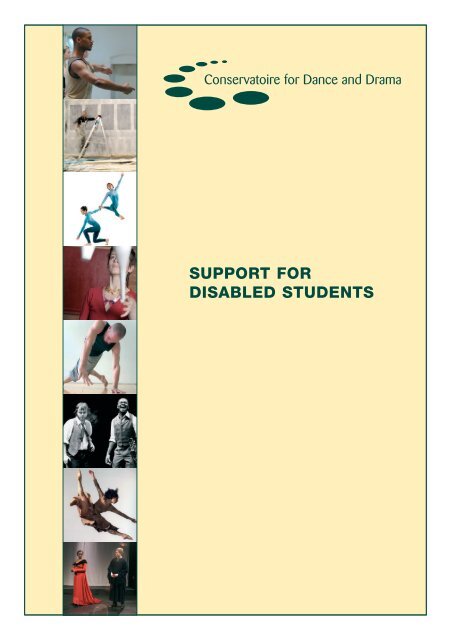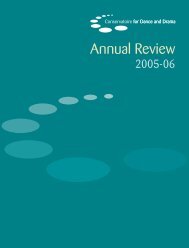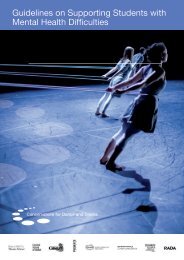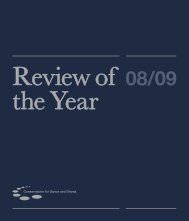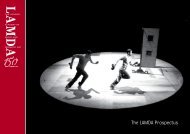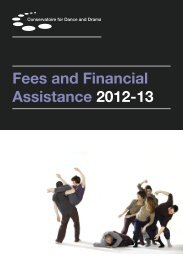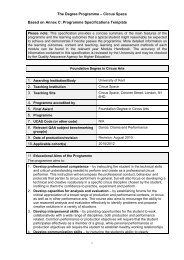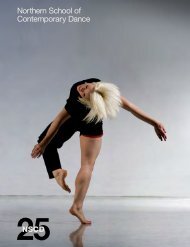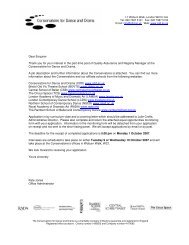Download as a PDF - Conservatoire for Dance and Drama
Download as a PDF - Conservatoire for Dance and Drama
Download as a PDF - Conservatoire for Dance and Drama
You also want an ePaper? Increase the reach of your titles
YUMPU automatically turns print PDFs into web optimized ePapers that Google loves.
<strong>Conservatoire</strong> <strong>for</strong> <strong>Dance</strong> <strong>and</strong> <strong>Drama</strong>SUPPORT FORDISABLED STUDENTS
Image courtesy of London Contemporary <strong>Dance</strong> SchoolContentsImage courtesy of Bristol Old Vic Theatre School1 Introduction Page 12 Disclosure of Confidential In<strong>for</strong>mation Page 63 Application, Audition <strong>and</strong> Interview Page 104 Learning Agreements Page 125 Applying <strong>for</strong> the Disabled Students’ Allowance Page 166 Support <strong>for</strong> Dyslexic Students Page 227 Mental Health <strong>and</strong> Counselling Service Page 268 Buildings Page 279 Complaints Page 2710 Useful Contacts Page 281
1. IntroductionThis guide is designed <strong>for</strong> anyone who isinterested in disability issues at the eightaffiliate schools of the <strong>Conservatoire</strong> <strong>for</strong><strong>Dance</strong> <strong>and</strong> <strong>Drama</strong>. It seeks to provide helpfulin<strong>for</strong>mation about the process of applying<strong>for</strong> a place at a <strong>Conservatoire</strong> school, thesupport that you can expect at your auditionor interview <strong>and</strong>, <strong>for</strong> those who are offereda place, during your course.It also provides helpful in<strong>for</strong>mation <strong>for</strong> staff,those planning to take a short course at oneof the schools, or <strong>for</strong> members of the publicwho have an interest in the work of the<strong>Conservatoire</strong>.Of course, if you are a student you wonʼtalways know what you will need be<strong>for</strong>e youapply or at the start of your course <strong>and</strong> theaim of this guide is to try to answer someof your questions. You will find furtherin<strong>for</strong>mation on the <strong>Conservatoire</strong> website<strong>and</strong> each school h<strong>as</strong> its own prospectus<strong>and</strong> website.There may also be additionalin<strong>for</strong>mation about one or more of the<strong>Conservatoire</strong> schools in the folderat the back of this guide.Throughout this guide you will findexamples of what disabled students have tosay about their experiences of studying atthe <strong>Conservatoire</strong> <strong>for</strong> <strong>Dance</strong> <strong>and</strong> <strong>Drama</strong>.On the <strong>Conservatoire</strong> website there are filmclips of these students involved in thecreative work that is at the heart of training<strong>for</strong> a career in the per<strong>for</strong>ming arts.What is the <strong>Conservatoire</strong><strong>for</strong> <strong>Dance</strong> <strong>and</strong> <strong>Drama</strong>?The <strong>Conservatoire</strong> <strong>for</strong> <strong>Dance</strong> <strong>and</strong> <strong>Drama</strong>(www.cdd.ac.uk) is one of the newest <strong>and</strong>most exciting higher education institutionsin the country. It w<strong>as</strong> established in 2001to secure the future of conservatoire-levelvocational training in dance <strong>and</strong> drama inEngl<strong>and</strong>. It h<strong>as</strong> a unique structure, madeup of eight affiliate schools. All are small,specialist, vocational training institutionswith international reputations <strong>for</strong> high qualitytraining in dance, drama, technical theatreor circus arts.Through the <strong>Conservatoire</strong>, all the affiliateschools receive funding from the HigherEducation Funding Council <strong>for</strong> Engl<strong>and</strong>.This helps to ensure that the most talentedstudents benefit from vocational trainingregardless of background or financialcircumstances.The affiliate schools of the<strong>Conservatoire</strong> (referred to <strong>as</strong>‘schools’ throughout this guide) are:Bristol Old Vic Theatre School:www.oldvic.ac.ukCentral School of Ballet:www.centralschoolofballet.co.ukThe Circus Space:www.thecircusspace.co.ukThe London Academy of Music <strong>and</strong><strong>Drama</strong>tic Art: www.lamda.org.ukLondon Contemporary <strong>Dance</strong> School:www.theplace.org.ukNorthern School of Contemporary <strong>Dance</strong>:www.nscd.ac.ukRambert School of Ballet <strong>and</strong>Contemporary <strong>Dance</strong>:www.rambertschool.org.ukRoyal Academy of <strong>Drama</strong>tic Art:www.rada.orgAll of the affiliate schools are small <strong>and</strong>this means that we are able to offer a2
Image courtesy of The Circus Spacesupportive <strong>and</strong> friendly environmentwhere you will be well known by thestaff. This makes it e<strong>as</strong>ier <strong>for</strong> schoolsto provide support which is designed<strong>for</strong> your individual needs.What is the <strong>Conservatoire</strong> policyon disabled students?The <strong>Conservatoire</strong> welcomes applicationsfrom disabled people <strong>and</strong> judges applicantssolely on their talent <strong>and</strong> potential to developthe skills required <strong>for</strong> their chosen profession.We are committed to admitting <strong>and</strong> supportingdisabled students <strong>and</strong> warmly encourage youto in<strong>for</strong>m the school so that appropriate supportcan be put into place <strong>as</strong> soon <strong>as</strong> possible.In the p<strong>as</strong>t, disabled people have not alwaysbeen given an equal chance to develop theirtalents <strong>and</strong> skills in the per<strong>for</strong>ming arts <strong>and</strong> ouraim is to remove any unnecessary barriers toyour teaching <strong>and</strong> learning.The Disability Discrimination Act means thatHigher Education Institutions are not allowedto treat disabled students ʻless favourablyʼ thantheir non-disabled peers <strong>for</strong> re<strong>as</strong>ons relatingto their disability without proper justification.You also have the right to expect ʻre<strong>as</strong>onableadjustmentsʼ to ensure that you do not faceany unfair disadvantages in relation to yourlearning or other <strong>as</strong>pects of student life.The Disability Equality Duty (2006) requiresus to proactively promote equality <strong>for</strong>disabled people.In addition to these legal rights, the<strong>Conservatoire</strong> recognises that everyone isan individual <strong>and</strong> will do its best to developyour talents <strong>and</strong> skills. Schools have foundmany imaginative <strong>and</strong> innovative ways toanticipate <strong>and</strong> respond to the needs ofdisabled people with the talent <strong>and</strong>enthusi<strong>as</strong>m <strong>for</strong> the highest level oftraining in acting, circus arts, dance<strong>and</strong> technical theatre.3
Image courtesy of London Contemporary <strong>Dance</strong> SchoolImage courtesy of The Circus SpaceHow are students selected?It is the <strong>Conservatoire</strong>ʼs policy to inviteall applicants to attend an audition orinterview. In order to make this process <strong>as</strong>fair <strong>as</strong> possible, it is important <strong>for</strong> you to letus know what kind of support you think thatyou might need at this stage. There is <strong>as</strong>pace on the application <strong>for</strong>m <strong>for</strong> you to tellthe school of any impairment or condition, <strong>for</strong>example dyslexia or other learning difficulty,a physical or sensory impairment or a longterm medical or mental health condition thatmight have an impact on your audition orinterview process, or on subsequent training.It is the schoolʼs responsibility to ensure thatre<strong>as</strong>onable adjustments are made so thatthere are no unnecessary barriers to youachieving your full potential.Who should I <strong>as</strong>k if I have an enquiryabout the course or selection process?If you have any concerns or issues youwould like to discuss be<strong>for</strong>e you apply, youshould contact the school (or schools) youare considering. We recognise that you maynot know what you will need at this stage<strong>and</strong> each school h<strong>as</strong> at le<strong>as</strong>t one member ofstaff who can discuss the audition/interviewprocess with you so that you can decidetogether what kind of support would behelpful. With your agreement, they will thenp<strong>as</strong>s on this in<strong>for</strong>mation to the relevantsenior member of staff.You will find the name of the person tocontact either on the schoolʼs website orin its prospectus <strong>and</strong> there are links to thisin<strong>for</strong>mation on the <strong>Conservatoire</strong> website.There may also be additional in<strong>for</strong>mationfrom individual schools in the folder at theback of this guideHow will this in<strong>for</strong>mation be treated?We acknowledge that you may wish todiscuss personal matters <strong>and</strong> anything youraise will be treated in confidence <strong>and</strong> onlydiscussed with other members of staff withyour permission.Who is included in theterm ‘disabled person’?The Disability Discrimination Act protectsthose people who are defined <strong>as</strong> disabledaccording to the definition in the Act. Thisdefinition of disability is: ʻa physical or mentalimpairment which h<strong>as</strong> a substantial <strong>and</strong>long-term adverse effect on a personʼs abilityto carry out normal day-to-day activities.ʼThis includes people with visual, hearing<strong>and</strong> mobility impairments, those with learningdifficulties, including specific learningdifficulties such <strong>as</strong> dyslexia <strong>and</strong> dyspraxia,4
Image courtesy of The Circus SpaceImage courtesy of the London Academy of Music <strong>and</strong> <strong>Drama</strong>tic Artthose with enduring mental health conditionssuch <strong>as</strong> depression <strong>and</strong> long term disorderedeating (ʻenduringʼ means of at le<strong>as</strong>t six monthsduration <strong>and</strong> likely to continue), long termmedical conditions which may be progressivesuch <strong>as</strong> cancer <strong>and</strong> HIV, <strong>and</strong> conditionswhich affect learning <strong>and</strong> social skills such<strong>as</strong> Aspergerʼs Syndrome or Attention DeficitHyperactive Disorder (ADHD). It also includespeople who may have ʻhiddenʼ impairments ormedical conditions which may fluctuate such<strong>as</strong> <strong>as</strong>thma, epilepsy or diabetes.If you have a condition which you do notconsider to be a disability but which youthink it would be helpful <strong>for</strong> the schoolto know about, you can discuss this inconfidence with the Registrar, Head ofStudies or your personal tutor be<strong>for</strong>e it isdiscussed with anyone else. You do notneed to be ʻregisteredʼ <strong>as</strong> a disabledperson to be covered by the Act.The social model of disabilityThe <strong>Conservatoire</strong> uses the Social Model ofDisability <strong>and</strong> this is the perspective whichhelps us to <strong>for</strong>m our policies. The ʻSocialModelʼ takes the view that society createsbarriers that ʻdisableʼ people from participatingfully <strong>and</strong> on an equal b<strong>as</strong>is with others <strong>and</strong>that wherever possible, these barriers ought tobe removed. <strong>Conservatoire</strong> schools have acommitment to removing unnecessarybarriers during the application <strong>and</strong> audition orinterview process <strong>and</strong> throughout the course,<strong>and</strong> to providing appropriate support so thatall students can achieve their full potential.What kinds of support will be available to me?The schools that make up the <strong>Conservatoire</strong>are small. Although this means that we maynot have all of the specialist resourcesavailable in large universities, the advantageis that students are known personally by alltheir teachers <strong>and</strong> wherever possible we offersupport tailored to your individual needs.The training you will receive is mostly b<strong>as</strong>edon practical <strong>and</strong> creative work in the studio<strong>and</strong> theatre environment. There are alsoelements of theoretical or academic workwhere you will need to develop your skills inreading, writing, research <strong>and</strong> note taking.We will work with you to identify potentialbarriers to developing skills in all <strong>as</strong>pects ofyour training <strong>and</strong> do what we can to removethem. Dyslexia is by far the most commonlydisclosed impairment, but we also haveexperience of training students with a widerange of impairments <strong>and</strong> conditions.Schools can <strong>as</strong>sist UK students in theirapplication <strong>for</strong> the Disabled StudentsʼAllowance <strong>and</strong> in finding specialist help.5
2. Disclosure of Confidential In<strong>for</strong>mationImage courtesy of London Contemporary <strong>Dance</strong> SchoolSharing confidential in<strong>for</strong>mationIn<strong>for</strong>mation about disability is consideredʻsensitive in<strong>for</strong>mationʼ <strong>and</strong> in order tocomply with both the Data ProtectionAct <strong>and</strong> the Disability DiscriminationAct, we try our best to:• <strong>as</strong>k your permission to p<strong>as</strong>s on thein<strong>for</strong>mation in order to make it possible<strong>for</strong> re<strong>as</strong>onable adjustments to be putinto place• in<strong>for</strong>m you of the procedures that aretaking place• guarantee that sensitive <strong>and</strong> otherpersonal in<strong>for</strong>mation is kept confidentialWe underst<strong>and</strong> that you may havereservations about declaring a disabilityor may disclose to one member of staffbut <strong>as</strong>k them to keep this in<strong>for</strong>mationconfidential. However, we aim <strong>for</strong> an open<strong>and</strong> honest culture about disability issues<strong>and</strong> encourage you to let your school knowof any impairment or condition so thatappropriate support can be put into place.We respect your right to decide not todisclose in<strong>for</strong>mation, or to disclosein<strong>for</strong>mation to one member of staff <strong>and</strong> <strong>as</strong>k<strong>for</strong> this in<strong>for</strong>mation to be kept confidential,but you need to recognise that where thisis the c<strong>as</strong>e, it may not always be possibleto put full support in place.Disclosure of in<strong>for</strong>mationStudents are encouraged to identifythemselves <strong>as</strong> disabled at any point, <strong>for</strong>example, when contacting the school <strong>for</strong>the first time, on an application <strong>for</strong>m, ataudition, at enrolment or induction, or atany point during the course. <strong>Conservatoire</strong>level training is rigorous <strong>and</strong> will placedem<strong>and</strong>s on both your physical <strong>and</strong>6
Image courtesy of the London Academy of Music <strong>and</strong> <strong>Drama</strong>tic Artemotional energy <strong>and</strong> it may be thatdisability-related issues arise duringthe course that have an impact on yourtraining. You are encouraged to discussthis with your tutor or another appropriatemember of staff.Once you have disclosed in<strong>for</strong>mation <strong>and</strong>have agreed with the school that it wouldbe helpful to in<strong>for</strong>m other staff of this inorder that you receive appropriate support<strong>and</strong> ʻre<strong>as</strong>onable adjustmentsʼ to teaching<strong>and</strong> learning, you will be <strong>as</strong>ked to sign adisclosure <strong>for</strong>m. This gives permission<strong>for</strong> agreed in<strong>for</strong>mation to be shared withmembers of staff. In order to respectstudent confidentiality, this in<strong>for</strong>mation iskept in a locked file <strong>and</strong> will not be sharedwith members of staff other than those towhom the student h<strong>as</strong> given permission.This procedure can also be used <strong>for</strong>temporary conditions that may have animpact on your training such <strong>as</strong> an accidentor injury <strong>and</strong> <strong>for</strong> other fluctuating conditionssuch <strong>as</strong> <strong>as</strong>thma or diabetes. It can alsobe used <strong>for</strong> mental health difficulties such<strong>as</strong> the onset of depression, anxiety oreating difficulties.The Learning AgreementAfter you have signed a disclosure <strong>for</strong>m,if this is appropriate, a senior member ofstaff or a dyslexia specialist teacher willmeet with you to draw up a personalLearning Agreement. See page 12 <strong>for</strong>more in<strong>for</strong>mation on this.7
Lucy Edwards (known to everyone <strong>as</strong> Ellie) is studying <strong>for</strong> herthree year BA in Professional Stage Management at Bristol OldVic Theatre SchoolImages courtesy of Bristol Old Vic Theatre SchoolI describe myself <strong>as</strong> dyspraxic with a strongelement of dyslexia. The dyspraxic part ofme means that I canʼt write very quickly or<strong>for</strong> very long without it becoming extremelypainful <strong>and</strong> unreadable <strong>and</strong> there are someco-ordination issues too. The dyslexic partmeans that I have some problems withlanguage, punctuation <strong>and</strong> vocabulary.I used to get incredibly frustrated in primaryschool. When I tried to read, it just felt likethe words wouldnʼt stay on the page <strong>and</strong>people used to laugh at me because of theway I held my pen – I kind of grab it, a bitlike a chimp.I went into college after secondary school<strong>and</strong> did a BTEC in per<strong>for</strong>ming arts <strong>and</strong> fromthere I got interested in back stage work.When I came <strong>for</strong> my interview I just feltcom<strong>for</strong>table straight away. Itʼs a fant<strong>as</strong>ticfeeling to go into a major professionalschool <strong>and</strong> just feel immediately at home.I must admit that the road that Iʼve beentreading h<strong>as</strong> not exactly been e<strong>as</strong>y. Thebits of the stage management course whichinvolve a lot of paperwork have been quitedifficult <strong>for</strong> me. The second term of the firstyear you are set projects from everywhere.It feels like the four corners of the earth areclosing in upon you <strong>and</strong> they are going tocrush you unless you get it all done. But Iʼmmanaging to get through it all. Iʼve gota laptop, a scanner, a printer paid by myDisabled Studentsʼ Allowance <strong>and</strong> this reallyhelps me. Without these, I would find it veryhard to keep up. Iʼve also got a dictationprogramme which I use <strong>for</strong> writing reports.If I go home from a long day I can sit atthe computer <strong>and</strong> dictate it rather haveto physically write it.The teachers are really helpful in thepractical parts of the course. In carpentryl<strong>as</strong>t term we were doing a lot of jigsawingwork, <strong>and</strong> my teacher got me shockresistant gloves so that I w<strong>as</strong>nʼt whackingmy wrist out every single time it vibrates.This problem with my wrists is part of beingdyspraxic <strong>and</strong> itʼs a really nice feeling toknow that you have this problem, but withsupport you can still achieve your goals.When I leave here I would really like tobecome a props maker. Itʼs just one ofthose things that really gives me a buzz,to be able to say “I made that”.I think that no matter what kind of conditionor disability you have, youʼve got to havethe p<strong>as</strong>sion to be able to do something<strong>and</strong> to do it well. Itʼs up to you whether ornot you want to change that p<strong>as</strong>sion intoa knowledge, or <strong>for</strong>ever to keep it lockedaway in a box.8
Images courtesy of Bristol Old Vic Theatre SchoolPete Wilmott is in the second year of a Diplomain Stage Management at Bristol Old Vic Theatre SchoolIʼve been wearing hearing aids since I w<strong>as</strong>four. Iʼve always wanted to come here butthe first time I applied I didnʼt get a place.So I found myself some work experienceon professional shows <strong>and</strong> then I w<strong>as</strong>accepted the second time around.I like to get ahead of myself so that I knowwhatʼs coming up next. I tend to go to thecourse leaders. They know the issues thatmight come up <strong>for</strong> me, what to expect, <strong>and</strong>they can p<strong>as</strong>s on this in<strong>for</strong>mation to otherteachers. In the carpentry <strong>and</strong> constructionworkshop <strong>for</strong> example, itʼs very noisy inthere <strong>and</strong> consequently I turn my hearingaids off. So if my tutor needs to get hold ofme weʼve worked out a way <strong>for</strong> him to giveme a visual sign or make a physical contact.Iʼd like to be a lighting designer becausewith lighting designing youʼre very visual<strong>and</strong> Iʼm really good at putting a visualimage on to stages. I love trying to workout what sort of surroundings, what sortof effects I could use.Iʼm learning such a lot on this course <strong>and</strong>I think itʼs going to set me up very well <strong>for</strong>the future.Another example is in the sounddepartment. In the p<strong>as</strong>t Iʼve used oneearpiece to listen to the person cueing me,but there are occ<strong>as</strong>ions where itʼs muche<strong>as</strong>ier to concentrate on whatʼs going onif I have two earpieces. We talked about it<strong>and</strong> did some research <strong>and</strong> the school gotsome dual muff headsets <strong>for</strong> me.9
3. Application, Audition <strong>and</strong> InterviewImages courtesy of London Contemporary <strong>Dance</strong> SchoolBe<strong>for</strong>e you apply:If you wish to apply to a <strong>Conservatoire</strong>school you will need to apply directly to theschool you have chosen. There is spaceon the application <strong>for</strong>m <strong>for</strong> you to disclosein<strong>for</strong>mation about your impairment orcondition <strong>and</strong> it is helpful to give <strong>as</strong> muchin<strong>for</strong>mation <strong>as</strong> you can. This in<strong>for</strong>mationwill be used to help the school to decide thebest way to support you during the audition/interview process, <strong>and</strong> if your applicationis successful, throughout your course.If you have any questions or concerns aboutthe course, or if there are any disabilityrelatedissues you would like to discussbe<strong>for</strong>e applying, you are welcome to contactthe school. There is always someone whois able to give you in<strong>for</strong>mation about theaudition process <strong>and</strong> the kind of adjustmentsthat might be appropriate <strong>for</strong> you. The detailsof who you should contact may be in thefolder at the back of this guide, or you cancheck in the schoolʼs prospectus or website.Once the school h<strong>as</strong> receivedyour application <strong>for</strong>m:If you tell us about a disability, medicalcondition or specific learning difficulty onyour application <strong>for</strong>m, someone from theschool will contact you to discuss anyadjustments or support you might need.With your permission, these adjustmentswill be shared with members of theaudition panel. In c<strong>as</strong>es where yourimpairment or condition is unlikely tohave an impact on the first stage ofthe audition or interview process, thisdiscussion will take place later, eitherwhen arrangements are made <strong>for</strong> arecall audition, or once you have beenoffered <strong>and</strong> accepted a place at theschool. At any stage of this process,disabled applicants are welcome tocontact the school, (ideally by letteror email) to discuss any concerns.10
What happens in anaudition or interview?All applicants who wish to train <strong>as</strong> anactor, dancer or circus artist in any of the<strong>Conservatoire</strong> schools will be offered anaudition, <strong>and</strong> those who wish to undergotraining in stage management <strong>and</strong> technicaltheatre will be invited to attend an interview.Once you have applied, schools will sendyou in<strong>for</strong>mation about what will happenat your audition or interview, but thein<strong>for</strong>mation below will give you someidea of this process:Audition at dance schools:This will include technique cl<strong>as</strong>ses in eitherballet, contemporary dance or both, <strong>and</strong>an interview. In some schools you willbe <strong>as</strong>ked to present a prepared soloper<strong>for</strong>mance piece. If you are successfulat the first stage you will be invited backto attend one or more further workshops.Audition <strong>for</strong> acting courses at dram<strong>as</strong>chools or <strong>for</strong> circus arts courses:At the first audition <strong>for</strong> a place on an actingcourse you will be <strong>as</strong>ked to per<strong>for</strong>m twoprepared pieces, followed by a shortinterview. C<strong>and</strong>idates who are successfulat this stage will usually be <strong>as</strong>ked to attendone or more follow up auditions <strong>and</strong> thesemight include: movement, singing, workingin groups <strong>and</strong> sight reading.For The Circus Space, the initial auditionincludes all <strong>as</strong>pects of the training:movement, theatre, acrobatics, technicalskills a prepared solo per<strong>for</strong>mancepiece <strong>and</strong> an interview.Interviews <strong>for</strong> Stage Managementor Technical Theatre Courses:For a place on these courses, all applicantswill be invited to attend an interview <strong>and</strong>might also be <strong>as</strong>ked to fill out aquestionnaire or other <strong>for</strong>ms. There isusually only one interview <strong>for</strong> a placeon a stage management or technicaltheatre course.Applications from overse<strong>as</strong> students:All of the procedures described abovemay be adjusted <strong>for</strong> applications fromoverse<strong>as</strong> students. You will find thisin<strong>for</strong>mation on the schoolʼs website<strong>and</strong> in its prospectus.Some examples of support that h<strong>as</strong>been offered to disabled c<strong>and</strong>idates(including those with dyslexia) ataudition <strong>and</strong> interview are:• arranging <strong>for</strong> sign language interpretersto be present;• extra time <strong>for</strong> completing questionnairesor other written material (<strong>for</strong> stagemanagement courses);• written material made available ina different <strong>for</strong>mat or larger font size;• a tour of the building prior to audition;• arrangements made <strong>for</strong> c<strong>and</strong>idates tobe in a particular position during aworkshop, or to have instructionsrepeated.Medical in<strong>for</strong>mationAt some point during this process, youwill be <strong>as</strong>ked to fill in a medical <strong>for</strong>m.This is usually done after you havebeen offered <strong>and</strong> have accepted a place.Because many of the courses at<strong>Conservatoire</strong> schools are physicallydem<strong>and</strong>ing, it is helpful <strong>for</strong> the school toknow of any medical condition or previousper<strong>for</strong>mance-related injury. This in<strong>for</strong>mationwill be used to support you in your training<strong>and</strong> will not be used in a prejudicial way.Medical in<strong>for</strong>mation falls into the categoryof personal <strong>and</strong> sensitive in<strong>for</strong>mation <strong>and</strong>is regarded <strong>as</strong> confidential.11
4. Learning AgreementsImage courtesy of Bristol Old Vic Theatre SchoolWhat is a Learning Agreement?The small <strong>and</strong> friendly nature of trainingat <strong>Conservatoire</strong> schools means that a highlevel of support is available to all students<strong>and</strong> there is more individual contact withstaff than you would find at a largeuniversity. However, it is often helpful<strong>for</strong> specific guidance to be given to staffabout the support needed by individualdisabled students.If you have disclosed a support need,you will be offered a Learning Agreement(some schools refer to this <strong>as</strong> the IndividualExtended Learning Agreement or PersonalLearning Plan).This is an agreementbetween a disabled student <strong>and</strong> the school.It is a written statement which describes thetype of support that is required <strong>and</strong> the wayin which it will be provided. It is a practical<strong>and</strong> positive way of in<strong>for</strong>ming thoseteaching <strong>and</strong> working with you (<strong>and</strong> thisincludes visiting professional directorsor choreographers <strong>and</strong> other part timeteachers)of these decisions.A senior member of staff or a dyslexi<strong>as</strong>pecialist teacher will arrange a meetingbe<strong>for</strong>e or <strong>as</strong> near to the start of the course<strong>as</strong> possible, to draw up a LearningAgreement. With your signed permission,copies are circulated to the members ofstaff who are named on the Agreement.There will be regular meetings to review thisplan <strong>and</strong> to make adjustments if needed.If you feel that there are any difficulties withcarrying out the support agreed, or if thesupport is not sufficient or appropriate <strong>for</strong>your needs, we encourage you to makean appointment to review the adjustments.Although we underst<strong>and</strong> that you may feelreluctant to do this, it is in everyoneʼsinterest to ensure that your needs arebeing met <strong>as</strong> far <strong>as</strong> is re<strong>as</strong>onably possible.12
Image courtesy of the Royal Academy of <strong>Drama</strong>tic ArtA Learning Agreement can be put into placeat any time during the course. Studentswith specific learning difficulties such <strong>as</strong>dyslexia are often identified later in thecourse <strong>as</strong> they begin to face newchallenges in both the practical <strong>as</strong>pectsof their training <strong>and</strong> (in the courses wherewritten work is part of the <strong>as</strong>sessment)when dealing with more advancedcontextual or academic work.Examples of Learning AgreementsIn the following list there are someexamples of support included in LearningAgreements at <strong>Conservatoire</strong> schools.(Support designed specifically <strong>for</strong> dyslexicstudents is described on page 22.)• communication support workers <strong>for</strong>a deaf student;• <strong>as</strong>king the teacher to remind groups tospeak one at a time; not speaking withtheir h<strong>and</strong>s over their mouths;• reminder to give both verbal <strong>and</strong>visual instructions;• allocating a few minutes at the end ofcl<strong>as</strong>s to go over material when possible;• <strong>for</strong> students who might find it difficult toread in<strong>for</strong>mation on notice boards,making provision <strong>for</strong> them to receivein<strong>for</strong>mation about meetings, roomchanges etc in a different way, e.g.via their pigeon hole, email or phone;• arranging <strong>for</strong> the student to be in aparticular position during technique cl<strong>as</strong>s;• giving out teaching material in advance<strong>and</strong> in a particular <strong>for</strong>mat;• arranging <strong>for</strong> singing cl<strong>as</strong>ses to bein an echo-free room.13
Who h<strong>as</strong> responsibility <strong>for</strong> my learning <strong>and</strong> teaching?Your school h<strong>as</strong> responsibility <strong>for</strong> ensuring that re<strong>as</strong>onable adjustmentsare in place so that you are not put at any unfair disadvantage. However,students have responsibilities too.Your school h<strong>as</strong> responsibility <strong>for</strong>:• providing you with the opportunity todisclose in<strong>for</strong>mation relating to yourdisability or condition in a confidentialsetting• giving you in<strong>for</strong>mation about what kindof support you can expect• your teaching• your welfare• if appropriate, working with you to drawup a Learning Agreement• making sure that all relevant membersof staff (including part time <strong>and</strong> visitingstaff) are in<strong>for</strong>med of the support thath<strong>as</strong> been agreed• arranging regular meetings with you toreview <strong>and</strong> update the Learning Agreement• in<strong>for</strong>ming staff of any new adjustments tothe Agreement• guiding you through your application<strong>for</strong> the Disabled Studentsʼ Allowance• giving you the support you need inorganising both the Psychological(diagnostic) <strong>and</strong> Needs Assessments• helping to provide financial support <strong>for</strong>dyslexic students who require diagnostic<strong>as</strong>sessment• organising 1-1 specialist support <strong>for</strong>dyslexic students or providing contacts<strong>for</strong> you to arrange this yourselfYou have responsibility <strong>for</strong>:• explaining your needs to theschool both at the start of thecourse, <strong>and</strong> throughout the course<strong>as</strong> the requirements <strong>and</strong> dem<strong>and</strong>sbecome clearer• your learning• looking after yourself <strong>and</strong> seekinghelp when needed• thinking about the kind of support thatwould help your learning <strong>and</strong> progress• being proactive in seeking help –not leaving it until too late• requesting review meetings if thereis anything that isnʼt working <strong>for</strong> you• attending any meetings that havebeen arranged• applying <strong>for</strong> the Disabled StudentsʼAllowance• taking advantage of, <strong>and</strong> making time<strong>for</strong> the IT training recommended in yourNeeds Assessment• providing the school with evidenceof any previous diagnostic<strong>as</strong>sessments• using your support appropriately,<strong>for</strong> example by turning up <strong>for</strong> any studysupport sessions arranged <strong>for</strong> you• organising staff training on disabilityissues, both general <strong>and</strong> specific14
Images courtesy of the London Academy of Music <strong>and</strong> <strong>Drama</strong>tic ArtNadia Albina is a recent graduate of theLondon Academy of Music <strong>and</strong> <strong>Drama</strong>tic ArtIʼm an actress. I graduated l<strong>as</strong>t year fromLAMDA <strong>and</strong> now Iʼm in the big wide worldtrying to get jobs. I w<strong>as</strong> born without myright <strong>for</strong>earm – itʼs a congenital thing.I always felt that it w<strong>as</strong> going to be difficultbecause I have never been to the theatre<strong>and</strong> seen an actor onstage who h<strong>as</strong> adisability but is playing a part thatdoesnʼt call <strong>for</strong> it.When I auditioned <strong>for</strong> LAMDA I did disclosethat I had a congenital disability but I didnʼtfeel like they were looking at that at all.I felt com<strong>for</strong>table that the audition panelwere judging me on my acting.The parts of the course that I felt might bevery challenging were the physical sides.When I first saw the fighting, I did have abit of a moment of thinking ʻhow am I goingto do this?ʼ because I wanted to be involvedwith everything that the school offers. But<strong>as</strong> soon <strong>as</strong> we started I found that thesupport w<strong>as</strong> there. Teachers werenʼtthinking about what I couldnʼt do, theywere thinking, weʼll find a way of makingthat move work – weʼll find a way ofchoreographing that. I never felt that therew<strong>as</strong> any pressure to do it a certain way.At one point in my training I had aprosthesis – I suggested it myself becauseI w<strong>as</strong> in the frame of mind where I thoughtthat if I covered up my arm, I would bemore acceptable to an agent or a c<strong>as</strong>tingdirector. But in my final show I did aproduction where the director encouragedme not to wear it because she made merealise I w<strong>as</strong>nʼt myself with it on, I didnʼthave <strong>as</strong> much freedom in myself or mybody. Since then Iʼve gone <strong>for</strong> auditions<strong>as</strong> myself <strong>and</strong> it h<strong>as</strong>nʼt been a problem.Iʼm beginning to get work.The best advice I could ever give someone is just to follow a dream that theyʼvehad. It shouldnʼt matter what you look like.You will always surprise yourself, <strong>and</strong> youwill always surprise others by just beingwho you are.15
5. The Disabled Students’ Allowance (DSA)Images courtesy of the Royal Academy of <strong>Drama</strong>tic ArtWho is eligible to apply <strong>for</strong> theDisabled Students’ Allowance?If you have been a resident of the UnitedKingdom (UK) <strong>and</strong> will face costs in yourstudies because you are disabled, youmay be eligible to apply <strong>for</strong> the DisabledStudentsʼ Allowance (DSA). This can coverthe cost of special equipment that isnecessary <strong>for</strong> your studies such <strong>as</strong>computers <strong>and</strong> software, non-medical helpsuch <strong>as</strong> study skills tuition, sign languageinterpreters, readers or note takers, <strong>and</strong>ancillary costs such <strong>as</strong> photocopying.Applications <strong>for</strong> this allowance are madethrough Student Finance Engl<strong>and</strong> (SFE).Once you have contacted them, theywill supply you with in<strong>for</strong>mation onhow to apply.Applying <strong>for</strong> the Disabled StudentsʼAllowance can be a time consumingprocess <strong>and</strong> it is important that you beginthis process <strong>as</strong> soon <strong>as</strong> possible. If you area UK student <strong>and</strong> know that you have acondition or disability that requires support,it is very helpful to start this process <strong>as</strong>soon <strong>as</strong> you have accepted a place.To be eligible <strong>for</strong> a DSA, you need todemonstrate to SFE that you:• can provide evidence that you have beena resident of the United Kingdom <strong>for</strong> atle<strong>as</strong>t three years be<strong>for</strong>e the start ofyour course;• have been offered a place at, or arecurrently attending, a <strong>Conservatoire</strong><strong>for</strong> <strong>Dance</strong> <strong>and</strong> <strong>Drama</strong> school;• have evidence that you are disabled.For dyslexic <strong>and</strong>/or dyspraxic studentsthis means a recent report from aneducational psychologist or similarlyqualified professional. For other disabledstudents it usually means some kind ofmedical evidence.Unlike a student loan, the DSA does not haveto be repaid. The Student Loans Companyh<strong>as</strong> a very helpful website with all thein<strong>for</strong>mation you will need to apply. To findthe Disabled Studentsʼ Allowance (DSA)application <strong>for</strong>ms, go to: www.directgov.uk<strong>and</strong> follow the links to Disabled Peoplethen to Education <strong>and</strong> Learning, thento Support at College or University.16
When you apply <strong>for</strong> the DSA, there isan extra procedure required <strong>for</strong> dyslexicstudents <strong>and</strong> those with other specificlearning difficulties. Dyslexic studentswho are eligible <strong>for</strong> the DSA will needan <strong>as</strong>sessment that h<strong>as</strong> been carriedout by an appropriately qualifiedpsychologist (or other approvedprofessional). If your school believesthat you need this <strong>as</strong>sessment, they willhelp you to organise an appointment.The psychologist will produce a writtenreport <strong>and</strong> will send you a copy whichyou need to <strong>for</strong>ward to SFE.How do I pay <strong>for</strong> theDiagnostic Assessment?For students who are being diagnosed <strong>as</strong>dyslexic <strong>for</strong> the first time, or whose diagnosticreport is out of date, your <strong>Conservatoire</strong>school will help you to obtain funding <strong>for</strong>a new or updated report. Funding may beprovided from the schoolʼs Accessto Learning or other Hardship Funds.The Registrar, Head of Studies or Head ofStudent Support will talk you through theprocess of applying <strong>for</strong> a diagnostic<strong>as</strong>sessment <strong>and</strong> put you in touch withrecommended psychologists. They canalso help you with the sections of theAccess to Learning Fund application <strong>for</strong>mthat you need to complete.What is a Needs Assessment Report?All students applying <strong>for</strong> the DisabledStudentsʼ Allowance (that is, not justdyslexic students) require a NeedsAssessment Report. If SFE h<strong>as</strong> advisedyou to contact a specific centre, the contactdetails can be found on the website of theNational Network of Assessment Centres(www.nnac.org). You can also <strong>as</strong>k your<strong>Conservatoire</strong> school to help to organisethis appointment at an Assessment Centrenear to the school. The <strong>as</strong>sessor will thenwrite a report which gives very detailedin<strong>for</strong>mation about the equipment <strong>and</strong>other support you require.For example, they may recommend:– a computer,– <strong>as</strong>sistive IT software or other equipment,– specialist one to one tuition,– camcorder,– support workers such <strong>as</strong> sign languageinterpreters, readers or note takers.This report is sent to SFE <strong>for</strong> authorisation.Once SFE approves this report, you mayorder the recommended equipment. You donot have to return any equipment supplied<strong>as</strong> part of your DSA but you will need to getit properly insured.Because conservatoire training is differentfrom conventional academic degreecourses, it is often helpful <strong>for</strong> both theeducational psychologist <strong>and</strong> the needs<strong>as</strong>sessor to know something about thepractical <strong>and</strong> vocational dem<strong>and</strong>s of yourcourse. A sample letter <strong>for</strong> <strong>as</strong>sessors isavailable from your school or from the<strong>Conservatoire</strong> website.The DSA <strong>and</strong> EU orInternational Students:Un<strong>for</strong>tunately, non-UK students arenot eligible <strong>for</strong> the Disabled StudentsʼAllowance. If you are in this position,you should contact your own governmentto find out whether they provide fundingto support the study needs of disabledstudents who are studying abroad.Specific funds:Some schools have specific funds to <strong>as</strong>siststudents in financial difficulties <strong>and</strong> disabledstudents who are not eligible <strong>for</strong> the DSA.For in<strong>for</strong>mation about this, you should talkto the Registrar, Student Support Officeror Head of Studies in your school.17
The chart below illustrates the process of applying <strong>for</strong> DisabledStudents’ Allowance if you are a UK student <strong>and</strong> are, or think youmight be, dyslexic:Do you have a post 16 report from either a chartered psychologist or a specialistteacher holding a Practising Certificate awarded by either Dyslexia Action orPATOSS (Professional Association of Teachers of Students with SpLDs)?YESNO• Contact the Registrar or Head ofLearning support who will refer you<strong>for</strong> an <strong>as</strong>sessment.• After the <strong>as</strong>sessment you will besent a report.Go to www.directgov.uk <strong>and</strong> follow the links to Disabled People thento Education <strong>and</strong> Learning, then to Support at College or Universityto find the Disabled Studentsʼ Allowance (DSA) application <strong>for</strong>ms.Complete <strong>and</strong> submit the relevant application <strong>for</strong>m.Send the requested evidence (your report) toStudent Finance Engl<strong>and</strong> (SFE).• SFE will then decide if you are eligible <strong>for</strong> <strong>as</strong>sistance.• If you are eligible, SFE will contact you <strong>as</strong>king you to attend a NeedsAssessment interview.• This interview is to work out exactly what you need in terms of equipment etc.• The interview venue will be either near your home or near your school.• After this interview, a report will be sent to SFE.• SFE will then contact you giving details on what you may purch<strong>as</strong>e <strong>and</strong> howto claim back the money spent on the recommended equipment etc.• Any recommended extra teaching will be put in place in discussion with yourself<strong>and</strong> your school.• The equipment will be yours to keep <strong>and</strong> is not just <strong>for</strong> the duration of the course.You should there<strong>for</strong>e to take out insurance to cover any expensive items.18
Student’s own photographStacey Abalogun is in her final year of the BPA (Hons) Degree inContemporary <strong>Dance</strong> at Northern School of Contemporary <strong>Dance</strong>.I w<strong>as</strong>nʼt diagnosed <strong>as</strong> being dyslexic untilI w<strong>as</strong> in the first year of the degree coursehere. I got referred by the Learning SupportTutor because my written work w<strong>as</strong>nʼt up tost<strong>and</strong>ard. Iʼd always struggled at school.I worked really hard, much harder thanother people <strong>and</strong> I w<strong>as</strong> always disappointedwith my results. After all the tests, it cameback that I w<strong>as</strong> severely dyslexic.The equipment I got with the DisabledStudentsʼ Allowance really h<strong>as</strong> helped me.ʻInspirationʼ is a computer programme thathelps you break down in<strong>for</strong>mation. Say <strong>for</strong>instance, if I have to write an essay <strong>and</strong>have no idea where to start, Iʼll type in somekey words <strong>and</strong> this will show me how to putthis into a mind map to organise my ide<strong>as</strong><strong>and</strong> help me structure my essay or plan apiece of writing. Also Iʼve got ʻRead <strong>and</strong>Write Goldʼ, which is another programmewhere when Iʼm actually typing it will readit back to me.Probably the biggest help of all is thecamcorder. When Iʼm in technique cl<strong>as</strong>sIʼm able to record my movement or whenIʼm choreographing my own works, then Ican look back on it <strong>and</strong> work on it at a laterstage, because everything takes longer.I have a Learning Agreement which Iʼvesigned. It highlights the positive points <strong>and</strong>the negative points about my learning <strong>and</strong>all my teachers get a copy of it. So <strong>for</strong>instance, in my c<strong>as</strong>e, if I need to be shownthe movement more than once – becausedyslexia does affect my memory ofmovement – I can <strong>as</strong>k my teachersto repeat a movement.The course here – I couldnʼt <strong>as</strong>k <strong>for</strong>anything more. The teachers are all reallygood <strong>and</strong> really supportive so you knowif youʼve got any problems or you donʼtunderst<strong>and</strong> anything at the end of cl<strong>as</strong>s,you can always go <strong>and</strong> <strong>as</strong>k.Once you find something in life that cantake a hold of <strong>and</strong> you can devote yourselfto it 100% it gives you something to live <strong>for</strong>.I wake up every morning <strong>and</strong> I get out ofbed, I come <strong>and</strong> dance. I go home Iʼm stilldancing. I work at weekends, Iʼm dancing.You know, itʼs my life. I couldnʼt see myselfdoing any other profession.19
Ira Siobhan, pictured above, is in his final year of a Per<strong>for</strong>mingArts degree at the Northern School of Contemporary <strong>Dance</strong>Images courtesy of Northern School of Contemporary <strong>Dance</strong>Iʼve known that Iʼve had dyslexia since I w<strong>as</strong>about seven years old. Iʼve always foundacademic work difficult <strong>and</strong> I just started touse my motivation <strong>and</strong> energy in differentways – sport <strong>and</strong> physical things becausethat w<strong>as</strong> where I could be at my best.I w<strong>as</strong> worried about doing a degree coursebecause of all the written work, but theyre<strong>as</strong>sured me that thereʼd be a lot ofsupport <strong>and</strong> ways we can work around it.On the open day I <strong>as</strong>ked the tutor in chargeof dyslexia support <strong>and</strong> she w<strong>as</strong> reallyre<strong>as</strong>suring – she told me that a lot of peoplewho are dyslexic go into dance like I have,so that gave me a bit of confidence. Weʼveworked out ways <strong>for</strong> me to present myessays in a spoken <strong>for</strong>m. Itʼs not an e<strong>as</strong>yoption but it works <strong>for</strong> me.It felt mathematical, thatʼs the only wayI can describe it – kind of like a grid or likelearning numbers. But I just knew if I couldget it, learn it piece by piece, add on eachnew movement to what I already knew,then I would improve so much more.I love ballet now.Sometimes I have to sit back <strong>and</strong> look atwhatʼs happened over the p<strong>as</strong>t few years.Itʼs gone so f<strong>as</strong>t. I look back <strong>and</strong> see whereI w<strong>as</strong> <strong>and</strong> the changes are just crazy –physically, mentally, every way. Itʼs not justbeing seen <strong>as</strong> a dancer, Iʼve grown <strong>as</strong> aperson <strong>as</strong> well. Really it couldnʼt have beena better environment <strong>for</strong> me – the mix ofthe people from all over the world, differentnationalities <strong>and</strong> different races. Itʼs beenan eye opener.At first I found it hard to keep up with ballet.I didnʼt have any kind of ballet background<strong>and</strong> I felt like it w<strong>as</strong> holding me back.20
Image courtesy of Royal Academy of <strong>Drama</strong>tic ArtAidan O’Reilly, pictured left, is in his second year of the BA inActing Degree at the Royal Academy of <strong>Drama</strong>tic ArtIʼm an actor or trying to be an actor. Thenature of my disability is that I only haveone eye <strong>and</strong> in technical terms what mostpeople see at 200 feet, I see at 20 feet,so details <strong>and</strong> things are gone.Iʼm American <strong>and</strong> I auditioned at the topof the UN building in New York on my 19thbirthday. Then I came to London to do thebig audition workshop. When I arrived,RADA had sent out a letter with a list of allthe things I needed, so everyone knew thatI had a visual impairment. I think itʼs goodthat people knew what to expect <strong>and</strong> then Iw<strong>as</strong> able to go up to the teacher myself <strong>and</strong>let them know how com<strong>for</strong>table I am with it.It w<strong>as</strong> fun. It w<strong>as</strong> a lovely day <strong>and</strong> Iremember thinking at the end of the day,I donʼt even care if I get in at this point,Iʼve had such a wonderful time.When I started the course one of my bigworries w<strong>as</strong> getting around the school<strong>and</strong> not getting lost. The school <strong>as</strong>ked twostudents in my year whether they would bewilling to keep an eye out <strong>for</strong> me <strong>and</strong> theypicked two very different kinds of peopleto do it, one whoʼs a very sharp guy, <strong>and</strong>one whoʼs very laid back. It w<strong>as</strong> re<strong>as</strong>suringto have this at the beginning <strong>and</strong> actuallyit w<strong>as</strong> nice to get to know two people inthat way.I met up with the Dean of Studies a weekbe<strong>for</strong>e cl<strong>as</strong>ses <strong>and</strong> we talked about whatkind of support I might need. It w<strong>as</strong> writtenup <strong>and</strong> I signed it, <strong>and</strong> this w<strong>as</strong> the LearningAgreement that w<strong>as</strong> p<strong>as</strong>sed out to theteachers be<strong>for</strong>e they met me. Iʼd never hadanything like this be<strong>for</strong>e <strong>and</strong> it seemed avery good idea, ʼcause teaching is a veryvulnerable thing to do anyway <strong>and</strong> ifsomeone kind of jumps in <strong>and</strong> goes “ohby the way, Iʼm half blind”, theyʼll wannaknow what to do.I think whatʼs wonderful about studying atRADA is that they expose you to so manydifferent ways of working from all over theplace. And you realise there is no one wayof working, <strong>and</strong> that each production youdo is going to be a new challenge <strong>and</strong>everyone h<strong>as</strong> to go about coping in a newway. And so you just have to consistentlyrise to whatever the bizarre challenge isput in front of you.I just love being with a bunch of intenselycreative young people, whose energyis contagious <strong>and</strong> who are inspiring tobe around.21
6. Dyslexic StudentsWhat is dyslexia?Dyslexia is a difficulty caused by subtleproblems with language processing whichare independent of intelligence, schoolexperience, social, economic or emotionalfactors. Dyslexia is the most commonlydisclosed impairment at the <strong>Conservatoire</strong><strong>for</strong> <strong>Dance</strong> <strong>and</strong> <strong>Drama</strong>, <strong>as</strong> it is in otherper<strong>for</strong>ming arts schools. Dyslexic studentsare often highly creative <strong>and</strong> imaginativepeople <strong>and</strong> with the right support they canachieve very high st<strong>and</strong>ards in their training.How does this affect learning?The implications of dyslexia on reading <strong>and</strong>writing are now well known. They include:• persistent, severe problems with spelling,even with e<strong>as</strong>y or common words;• problems with ordering thingssequentially, such <strong>as</strong> letters, numbers,words or ide<strong>as</strong>;• taking longer to read texts <strong>and</strong> scripts;• needing more time to produce writtenwork such <strong>as</strong> essays, reports, researchnotes <strong>and</strong> portfolios;• misreading or miscopying;• difficulty with multiple activities such <strong>as</strong>listening <strong>and</strong> taking notes in lectures;• persistent problems with sentencestructure, punctuation <strong>and</strong> organisationof written work;• prone to <strong>for</strong>getting dates, times <strong>and</strong>places of meetings <strong>and</strong> other problemswith organisation <strong>and</strong> memory;Less well known are the ways in which dyslexiacan have an impact on the practical <strong>and</strong>creative side of your training. Dyslexic studentsstudying at <strong>Conservatoire</strong> schools have spokenabout their difficulty with such things <strong>as</strong>:• remembering dance <strong>and</strong> movementsequences <strong>and</strong> routines;• learning lines;• making the link between seeing <strong>and</strong>doing – <strong>for</strong> example students findingthemselves moving off on the wrongleg in technique or movement lessons;• some of the practical <strong>as</strong>pects of stagemanagement courses – <strong>for</strong> example,working with me<strong>as</strong>urements, ratios ornumber sequences <strong>for</strong> lighting.What kind of support is available<strong>for</strong> dyslexic students?Most of your <strong>as</strong>sessments at <strong>Conservatoire</strong>schools are b<strong>as</strong>ed on technique,per<strong>for</strong>mance or practical theatre skills.In some schools, academic or contextualessays <strong>for</strong>m part of the <strong>as</strong>sessmentprocess, but students are not required totake written examinations in any of theundergraduate or postgraduate degrees.However all courses require high levelsof skill in reading, writing <strong>and</strong> note-taking<strong>and</strong> schools are able to provide learningsupport in these are<strong>as</strong>. This support canbe offered in the following ways.Specialist dyslexia tutors:Dyslexic students who receive the DSA(see page 16) are usually also entitledto one to one support from a specialistteacher. This can be organised by yourschool <strong>and</strong> is paid <strong>for</strong> by SFE. Thespecialist tutor will help you to developyour skills in such are<strong>as</strong> <strong>as</strong> writing,organisation <strong>and</strong> memory.Library, learning resources,IT facilities, <strong>as</strong>sistive software:As all of the <strong>Conservatoire</strong> schools aresmall, they are unlikely to have the fullrange of <strong>as</strong>sistive software in the libraries.Dyslexic students with the DSA will havereceived <strong>as</strong>sistive technology <strong>and</strong> thetraining to use it, <strong>and</strong> some libraries haveequipment that can be loaned to students.22
Images courtesy of the Rambert School of Ballet <strong>and</strong> Contemporary <strong>Dance</strong>The following software programmes areavailable in some school libraries <strong>and</strong> thereare members of staff who are happy to helpyou with these:• Inspiration: This is a mind mappingprogramme which helps plan <strong>and</strong>structure written work.• TextHelp! Read <strong>and</strong> Write: This is a textto speech programme that listens to theuserʼs written work to check <strong>for</strong> grammar<strong>and</strong> spelling or to listen to long writtenp<strong>as</strong>sages viewed on the screen.Tutors <strong>and</strong> Learning Support Teachers:Schools have well developed tutorialsystems <strong>and</strong> all students have regularopportunities to discuss any learningdifficulties (both practical <strong>and</strong> academic)with their teachers <strong>as</strong> they arise. Someschools also employ a learning supporttutor who can offer individual help withplanning, re-drafting <strong>and</strong> writing t<strong>as</strong>kssuch <strong>as</strong> essays, reports <strong>and</strong> portfolios.made <strong>as</strong> <strong>and</strong> when they arise to meetproblems that have not been anticipated.For example, students in stagemanagement courses might be showna different way to use me<strong>as</strong>uring devicesor record lighting sequences <strong>and</strong> teachersoften invent ways to <strong>as</strong>sist students whofind it difficult to learn dance notation,lines or dialect.Some examples of adjustments that arefrequently made <strong>for</strong> dyslexic/ dyspraxicstudents include:• help with ʻover learningʼ (i.e. by constantrepetition) <strong>for</strong> students who take longerto learn routines, sequences <strong>and</strong> lines;• presenting academic work in a different<strong>for</strong>mat, <strong>for</strong> example, an oral presentation;• extended deadlines with written work<strong>and</strong> allowances made <strong>for</strong> grammar<strong>and</strong> spelling;• longer lending times in the library;• one to one study skills support.Adjustments made <strong>for</strong> dyslexicstudents in conservatoire training:As students spend a large part of each daydeveloping their practical <strong>and</strong> per<strong>for</strong>manceskills in the workshop, studio <strong>and</strong> theatre,it is often possible <strong>for</strong> adjustments to be23
Nick Lawson, pictured above, h<strong>as</strong> completed his BA Hons Degree inContemporary <strong>Dance</strong> at London Contemporary <strong>Dance</strong> School <strong>and</strong> isnow in EDge, the school’s postgraduate dance company.Images courtesy of London Contemporary <strong>Dance</strong> SchoolI have been dance training <strong>for</strong> seven years.Iʼm now dancing <strong>for</strong> EDge which is a semiprofessionalcompany. Itʼs like the next stepup <strong>and</strong> this yearʼs really been about findingwho I am <strong>as</strong> a dancer.I w<strong>as</strong> very into sport at school <strong>and</strong> then Isaw a professional dance company per<strong>for</strong>m,<strong>and</strong> I thought, okay, somethingʼs kind ofmissing in the sports. Itʼs very physical butthereʼs also like another element to beingphysical, like the softness <strong>and</strong> also a wayof expression.I have been aware of being dyslexic fromthe age of seven. Itʼs been a long journeyto try <strong>and</strong> underst<strong>and</strong> how dyslexia worksin my learning process. Being dyslexic I findit hard to kind of express myself, especiallyin writing <strong>and</strong> sometimes in words <strong>as</strong> well –finding the right words. I find that in danceI can express myself through movement,so this is like another way of communicating– a way of underst<strong>and</strong>ing my mind <strong>and</strong>body <strong>and</strong> expressing who I am <strong>as</strong> aperson. Itʼs fun <strong>as</strong> well.tell all the teachers <strong>and</strong> I thought thatʼs fine,because itʼs best <strong>for</strong> them to be aware, tounderst<strong>and</strong> that dyslexia actually affects notjust your writing, it affects every single partof your life.The teachers have been very supportive<strong>and</strong> very kind of strict with me. Theyʼre like“Nick, do you know what you are doing?”Iʼm like “Yes”. And they say, “Nick, do itagain.” And <strong>for</strong>cing me to repeat <strong>and</strong> repeat<strong>and</strong> repeat, which then lets the material sinkinto my body rather that my brain.Sequences that take other people a matterof minutes, can take me days to learn. Iʼvelearned to not panic in the cl<strong>as</strong>s situation<strong>and</strong> just to say to myself, “itʼs okay that itʼstaking me a long time to learn this routine”.Iʼll kind of take it down to the very b<strong>as</strong>ics<strong>and</strong> break it down movement by movement.So itʼs being very patient with myself.There were quite a few dyslexic studentsin my year <strong>and</strong> we took our problems tothe school <strong>and</strong> said. “Okay, being dyslexicwe find it hard to pick up <strong>and</strong> remembermaterial.” Then they <strong>as</strong>ked permission to24
Images courtesy of the Royal Academy of <strong>Drama</strong>tic ArtSophie Stone is in her first year of an actingdegree at the Royal Academy of <strong>Drama</strong>tic ArtI wrote that I w<strong>as</strong> severely deaf on myapplication <strong>for</strong>m. The <strong>for</strong>m said, ʻdo youhave a disability, what kind of help do yourequire?ʼ <strong>and</strong> nobodyʼs ever really <strong>as</strong>kedme this be<strong>for</strong>e. And I just thought, okay,I need to put something down <strong>and</strong> so Iwrote down ʻyes, somebody who signs <strong>for</strong>me <strong>and</strong> maybe a note taker.ʼ I didnʼt needthem <strong>for</strong> the initial, individual auditions, butwhen I got a place on the final workshopthere were two interpreters there. It reallyhelped. I still maintained my independencebut I w<strong>as</strong> able to show myself at my best.And then I got in. I w<strong>as</strong> so excited, it w<strong>as</strong>like, little old me in this great place.When I started my training I didnʼt know howI would cope because I hadnʼt had a greatdeal of support be<strong>for</strong>e coming to RADA withinterpreters or communication supportworkers or anything like that <strong>and</strong> I w<strong>as</strong>nʼtreally sure what to expect. There w<strong>as</strong> alsothe feeling that there might be a stigmaattached, that other students might see me<strong>as</strong> ʻthe deaf person,ʼ <strong>and</strong> Iʼd really st<strong>and</strong> out.But if anything, the opposite h<strong>as</strong> happened.Everybody h<strong>as</strong> been extremely supportive,very accommodating of my interpreters.I had communicators full time <strong>for</strong> the firsttwo weeks <strong>and</strong> then I felt confident aboutbeing able to pick <strong>and</strong> choose the lessonswhere I needed help. I realised that I needsomeone who is flexible, who can writenotes <strong>for</strong> me, tell me where to be. Itʼsgood if they know something aboutacting training.My acting teachers are all aware of myneeds. Be<strong>for</strong>e I started the course, theteachers attended a talk where a trainerwhoʼs deaf herself came in <strong>and</strong> explainedthe doʼs <strong>and</strong> donʼts of teaching a cl<strong>as</strong>swith a deaf student.Itʼs taken a while, but over time all theteachers are starting to click <strong>and</strong> rememberthe simple things, like turning round toface me, keeping their h<strong>and</strong>s away fromtheir faces, stepping a foot away fromthe window. And then it becomes sonatural that itʼs an unconscious decision– to do something to accommodate mein the lesson.Iʼm not naïve. I do know that when Iʼm goingout there looking <strong>for</strong> work, Iʼm going to beseen <strong>as</strong> a deaf actress. But my sole aimis to fight that. I do not want to be SophieStone, the deaf actress. Itʼs not me being<strong>as</strong>hamed of my deafness, itʼs me saying“okay, Iʼm deaf. Now can I be an actress?”25
7. Mental Health <strong>and</strong> Counselling ServiceImage courtesy of Bristol Old Vic Theatre SchoolThe term ʻmental healthʼ describes a senseof well being, the capacity to live in aresourceful <strong>and</strong> fulfilling manner <strong>and</strong>to have the resilience to deal with thechallenges <strong>and</strong> obstacles which lifepresents. Those who experience ʻmentalhealth difficultiesʼ may be very successful<strong>as</strong> students studying <strong>for</strong> a career in theper<strong>for</strong>ming arts, but they may also requiresupport to enable them to participate fully ina training that places great dem<strong>and</strong>s onboth physical <strong>and</strong> emotional energy.This service is offered free of charge.You can also self refer <strong>and</strong> this in<strong>for</strong>mationis usually provided in your studenth<strong>and</strong>book. Seeing a counsellor willgive you the opportunity to work throughdifficult issues in some depth.The counsellor operates a code ofconfidentiality set out by her or hisprofessional body.Leaving home <strong>for</strong> the first time, studyingabroad, making new friends can all have aneffect on your mental health <strong>and</strong> this cansometimes affect your ability to fully engagein your training.Some students will have experiencedmental health difficulties be<strong>for</strong>e startingtheir training <strong>and</strong> others will find that theyare beginning to have difficulties with suchthings <strong>as</strong> concentration, motivation,stamina, creativity, attendance, eatingregularly, managing anxiety or mood swings<strong>and</strong> sleep patterns. In these circumstancesit is important that you seek help. Talking toyour Tutor, Course Leader, Registrar orHead of Student Support is the first step.All schools can help you to makearrangements to see a counsellor.26
Images courtesy of the Northern School of Contemporary <strong>Dance</strong>8. Buildings 9. Complaints<strong>Conservatoire</strong> schools are housed ina variety of buildings <strong>and</strong> use differentper<strong>for</strong>mance spaces. Whilst all schools arefully committed to improving access, somehave been newly refurbished <strong>and</strong> are nowfully accessible, whilst others are still in theprocess of finding funding <strong>for</strong> new premisesor improvements to their existing buildings.In<strong>for</strong>mation about school buildings canbe found in the in<strong>for</strong>mation at the backof this pack or on the schoolʼs website<strong>and</strong> prospectus.There are a number of <strong>for</strong>mal <strong>and</strong> in<strong>for</strong>malways in which students can bring a rangeof disability related issues to the attentionof the managers at <strong>Conservatoire</strong> schools.Our aim is to react positively to criticism<strong>and</strong> to improve the quality of our services.Details of the complaints procedure canbe found in the Student H<strong>and</strong>books ofindividual schools.Applicants with any kind of access issuesare welcome to call the school <strong>and</strong> <strong>as</strong>k <strong>for</strong>a tour of the buildings.27
10. Useful ContactsImages courtesy of the Central School of BalletSkill: National Bureau <strong>for</strong>Students with DisabilitiesGeneral advice, in<strong>for</strong>mation <strong>and</strong> guidanceabout being a disabled studentFreephone: 0800 328 5050 – In<strong>for</strong>mationService (13.30 to 1630 Monday to Friday)Textphone: 0800 068 2422Fax: 020 7450 0650Email: info@skill.org.ukWebsite: www.skill.org.ukDisability Rights CommissionGeneral in<strong>for</strong>mation <strong>and</strong> advice onyour rights <strong>as</strong> a disabled personTel: 0845 7 622 633Fax: 0845 7 778 878Website: www.drc.org.ukDepartment <strong>for</strong> Education<strong>and</strong> Skills (DfES)Up to date in<strong>for</strong>mation from theGovernment about disability supportin higher eductionTel: 0870 000 2288 In<strong>for</strong>mation line<strong>for</strong> publicationsTel: 0800 731 9133Website: www.dfes.gov.uk/studentsupportBelow are two dyslexia centresin the London area. For schoolsin other are<strong>as</strong>, see the in<strong>for</strong>mationat the back of this guide or lookon your school’s website.Adult Dyslexia & Skills DevelopmentCentre (London, Euston area)For dyslexia <strong>as</strong>sessments <strong>and</strong> studyskills tuition2nd Floor1-7 Woburn WalkLondon WC1H 0JJTel: 0207 388 8744Fax: 0207 387 7062website: www.adultdyslexiacentre.co.ukDyslexia Action(London, Victoria area)Dyslexia reports, study skills tuition <strong>and</strong>in<strong>for</strong>mation about dyslexia <strong>and</strong> dyspraxiaTel: 020 7730 8890Fax: 020 7730 0273Email: london@dyslexiaaction.org.ukWebsite: www.dyslexiaaction.org.ukPhotographers: Patrick Baldwin, Graham Burke, Tony Coe, Toby Farrow, Dennis Gilbert,Hugo Glendinning, John Haynes, Mick Hurdiss, Benedict Johnson, Roderik Longhurst, Mike M<strong>as</strong>singham,Patricia Myers, Chris N<strong>as</strong>h, John Pridmore, Brian Slater, Richard H. Smith, Karen Wilkinson.28
www.cdd.ac.ukwww.nscd.ac.ukwww.oldvic.ac.ukwww.centralschoolofballet.co.ukThe Circus Spacewww.thecircusspace.co.ukwww.theplace.org.ukwww.lamda.org.ukwww.rambertschool.org.uk<strong>Conservatoire</strong> <strong>for</strong> <strong>Dance</strong> <strong>and</strong> <strong>Drama</strong>www.rada.orgTavistock House, Tavistock Square, London, WC1H 9JPTel: +44 (0)20 7387 5101Fax: +44 (0)20 7387 5103Email: info@cdd.ac.uk


